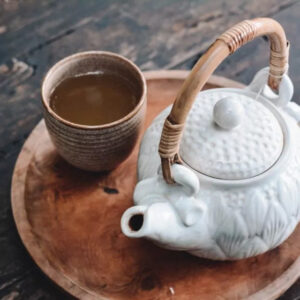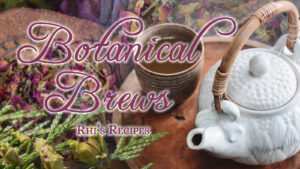Posted in DG Blog, Herbs, Roots and ResinsHolistic Healing
In the midst of our daily lives, finding moments of calm and connection can be challenging. I’ve found that weaving rituals into my daily routines can elevate the mundane into something deeply meaningful. For me, this journey began with a simple yet profound act: embracing the ritual art of herbal tea-making. Read on to discover the transformative world of tea, the benefits of specific herbs, and a selection of my favorite herbal blends.
The art of making tea is, at its core, a therapeutic practice. As the fragrance of the brewing herbs and spices fills the air, stress dissipates, filling one with a sense of calm. Embracing tea as a daily self-care practice becomes a small yet powerful act of nurturing oneself.
What defines a tea ritual? It’s not a strict set of guidelines, but rather a fluid, graceful dance of flavors and a moment steeped in mindfulness. For me, it entails selecting the perfect combination of herbs, flowers, and spices tailored to my immediate health needs—be it mental, emotional, or physical. It’s a personal journey—a daily ceremony that ignites awareness and self-care.
Even your water is more than a mere ingredient in tea – it is the alchemist in this ritual, transforming and absorbing the essence of the herbs, flowers and spices as it brews. The quality of your water, its temperature, and the brewing time are the silent conductors orchestrating the symphony of flavors. The alchemy of water turning into a vessel of nuanced tastes is nothing short of extraordinary. Thus, infusing the water with your intention becomes a sacred act—whether through intention, prayer, symbols, or sound —imbuing each cup with a specific frequency. From holding the cup, taking the first sip and throughout the drinking process, the intentionality of this practice merges with the herbal vibrations, creating a harmonious blend of physical and spiritual nourishment.
Thus, infusing the water with your intention becomes a sacred act—whether through intention, prayer, symbols, or sound —imbuing each cup with a specific frequency. From holding the cup, taking the first sip and throughout the drinking process, the intentionality of this practice merges with the herbal vibrations, creating a harmonious blend of physical and spiritual nourishment.
If you choose to add honey to your tea, a mindful moment can occur by honoring the intricate relationship between humans and bees. Beyond its sweetness, honey embodies the essence of flowers and sunlight, carrying within it the healing properties of nature. Stirring honey into tea becomes an act of gratitude, infusing each sip with appreciation for the bees’ tireless work. In this ritual, there’s a profound recognition of the interconnectedness of all beings and a commitment to preserving the delicate balance of our planet for generations to come.
In the world of herbal tea, each ingredient brings its own unique blend of flavors and benefits. Let’s explore some of the key herbs and spices commonly used in tea-making:
Peppermint: Known for its refreshing taste and invigorating aroma, peppermint tea offers a myriad of health benefits. It’s renowned for its ability to support digestion, alleviating symptoms such as indigestion, bloating, and gas. Thanks to its menthol content, it acts as an antispasmodic, relaxing muscles and providing relief from nausea, motion sickness, and headaches. Peppermint tea also boasts antioxidant properties, reducing inflammation and promoting mental clarity and concentration.
Cloves: These aromatic buds are not just a spice for cooking; they also make a flavorful addition to herbal teas. Cloves are known to regulate blood sugar levels and possess antibacterial properties. They also support digestion and reduce inflammation throughout the body.
Cinnamon Sticks: With their warm, comforting flavor, cinnamon sticks are a staple in many herbal tea blends. They contain bioactive compounds that help improve insulin sensitivity and regulate blood sugar levels. Cinnamon is also rich in antioxidants, promotes digestive health, and has anti-inflammatory properties. Additionally, it can lower levels of bad cholesterol and boost cognitive function and memory.
Rosemary: This fragrant herb is not only a culinary delight but also a powerhouse of health benefits. Rosemary supports digestion and enhances memory, clarity, and overall cognitive function. It possesses antioxidant, antimicrobial, and immune-boosting properties, making it a valuable addition to any herbal tea blend. Rosemary is also known for its calming effects and benefits for heart health.
Chamomile: Often associated with relaxation and tranquility, chamomile tea is cherished for its soothing properties. It promotes restful sleep and provides digestive support. It’s a gentle yet effective herb with anti-inflammatory and immune-boosting qualities.
Lavender: This delicate flower lends a refreshing and calming flavor to herbal teas. Lavender tea is perfect for relaxation and soothing upset stomachs. It possesses antioxidant and anti-inflammatory properties, promoting overall well-being and tranquility.
Lemon Verbena: With its citrusy flavor, lemon verbena tea offers a refreshing and invigorating experience. It reduces stress, thanks to its antioxidant and anti-inflammatory properties, and provides a boost to the immune system. Lemon verbena tea is also rich in vitamin C, supports weight loss efforts, and promotes restful sleep.
Rose Petals: Symbolizing love and beauty, rose petals infuse herbal teas with a delicate floral flavor. They are known for their calming and soothing effects, as well as their antioxidant properties. Rose petals support digestion, liver health, and immune function, making them a valuable addition to herbal tea blends.
When brewing herbal tea, I recommend bringing the water to a rapid boil to fully extract the flavors and medicinal properties of the herbs and spices. Here are some other tips to help you brew the perfect cup of herbal tea, tailored to your personal preferences:
Loose Leaf Herbs: For loose leaf herbs like chamomile, mint, or lavender, a good rule of thumb is to use about 1-2 teaspoons of dried herbs per cup of water. Simply steep the herbs in hot water, covered, for approximately 5-7 minutes to extract their full flavor and aroma.
Whole Spices: If you’re incorporating whole spices such as cinnamon sticks or cloves into your tea blend, you might use 1-2 whole pieces per cup of water, depending on the size and potency of the spice. Steep the spices in hot water, covered, for approximately 5-10 minutes to infuse the tea with their rich flavors.
Ground Spices: Ground spices like ginger or turmeric add warmth and depth to herbal teas. Start with about 1/4 to 1/2 teaspoon of ground spice per cup of water, adjusting to taste. Steep the tea, covered, for approximately 3-5 minutes to allow the spices to meld and infuse the water with their aromatic goodness.

Here are a few of my favorite combinations to introduce you to the aromatic healing world of herbal teas.
Warming Cinnamon Spice Tea:
1 crushed cinnamon stick
2-3 whole cloves
2 tsp peppermint
Steep 5 -10 minutes
Soothing Peppermint Rose Tea:
1 tsp dried rose petals
1 tsp dried peppermint
Steep 5 – 7 minutes
Calming Chamomile and Lavender:
1 tablespoon dried chamomile flowers
1 teaspoon dried lavender buds
Steep 5 – 7 minutes
Invigorating Lemon Verbena and Rosemary:
1 tablespoon dried lemon verbena leaves
1 teaspoon dried rosemary leaves
Steep for 7 – 10 minutes
Enjoy customizing your tea experience and exploring the rich tapestry of flavors and aromas found in nature’s bounty by adjusting the quantities and combinations of herbs, spices, and flowers to suit your preferences. Let the magic of herbal teas envelop you in warmth and wellness, transporting you to a realm of tranquility and nourishment with each comforting sip. Enjoy the journey of discovery and savor the beautiful symphony of flavors that awaits in every cup.